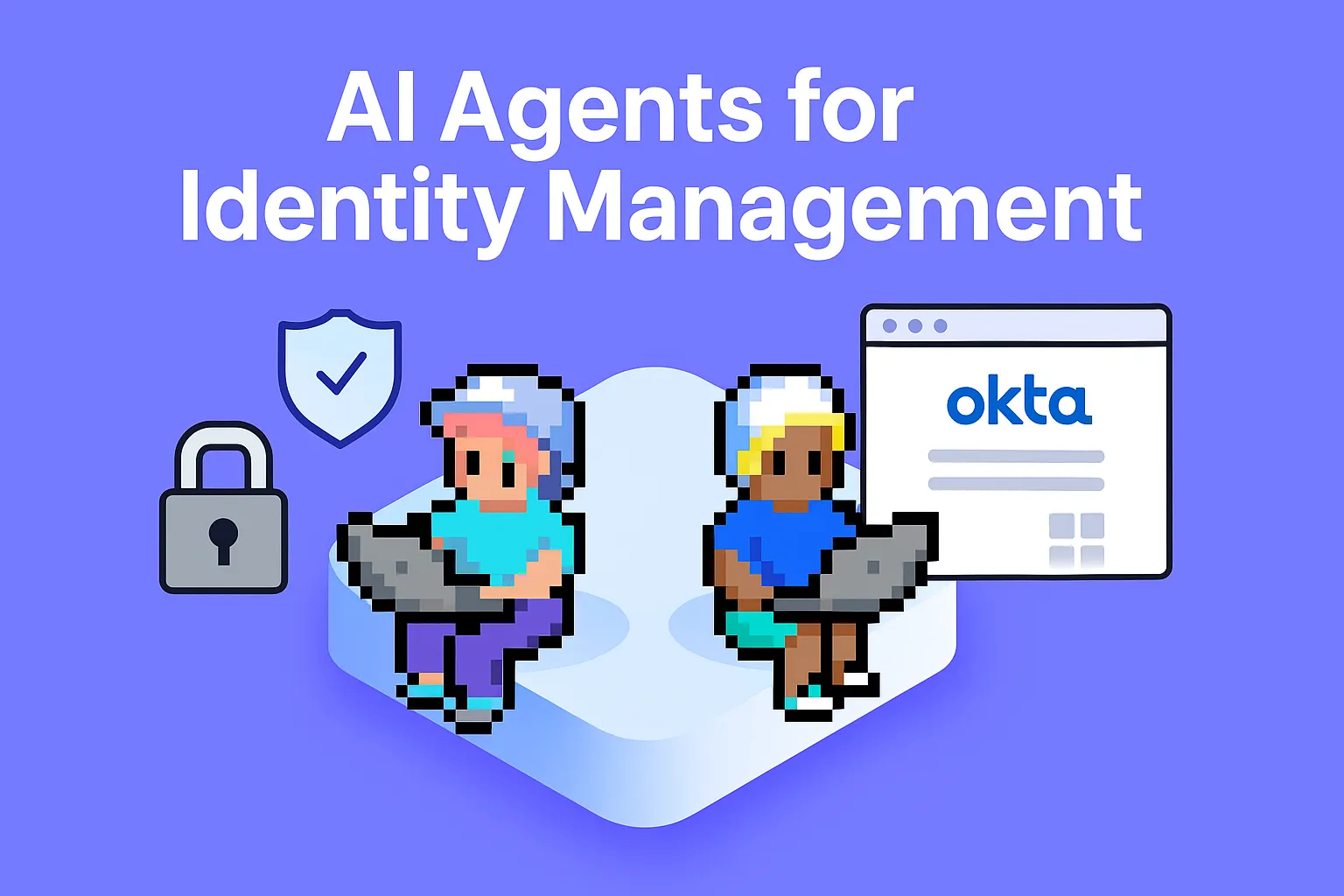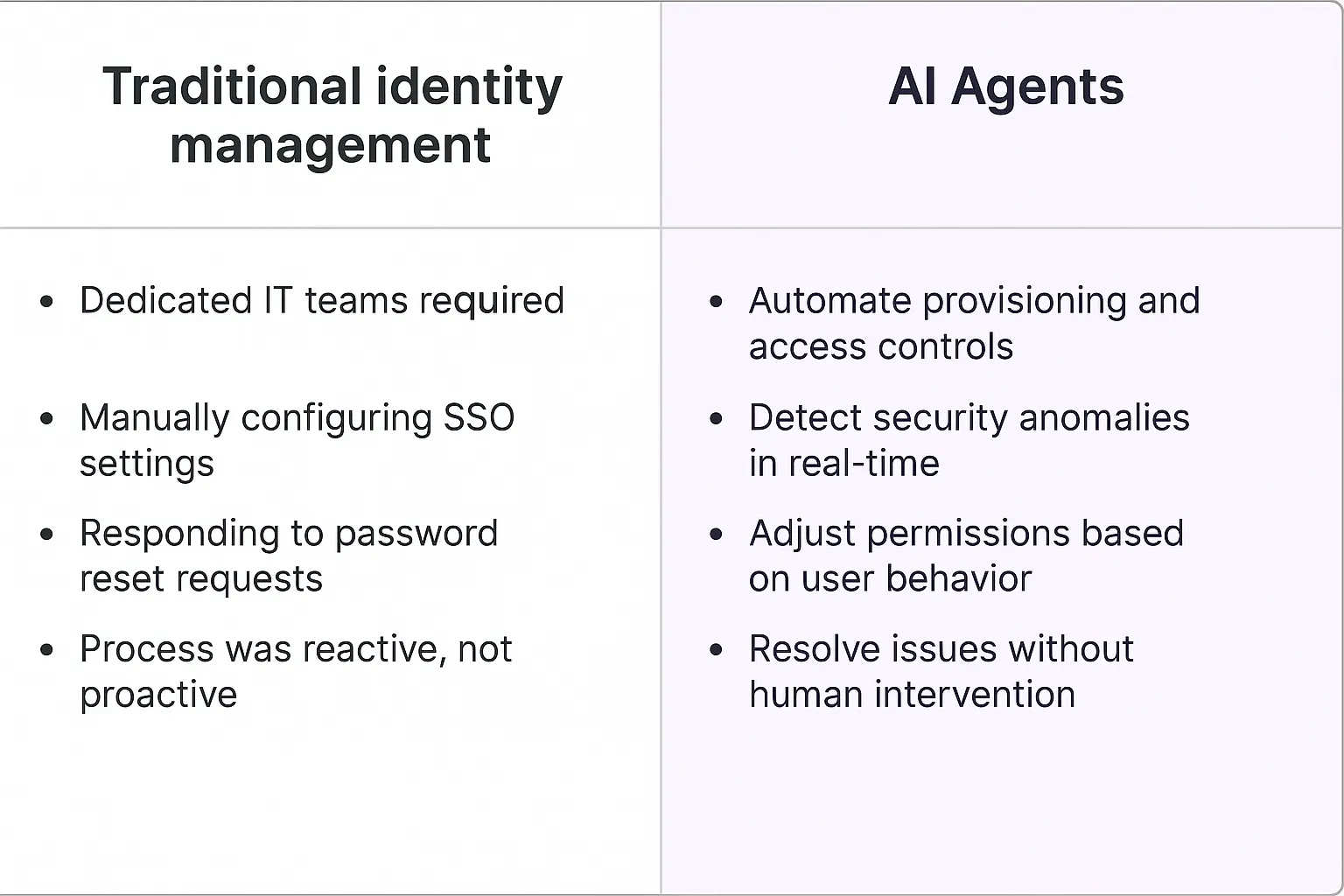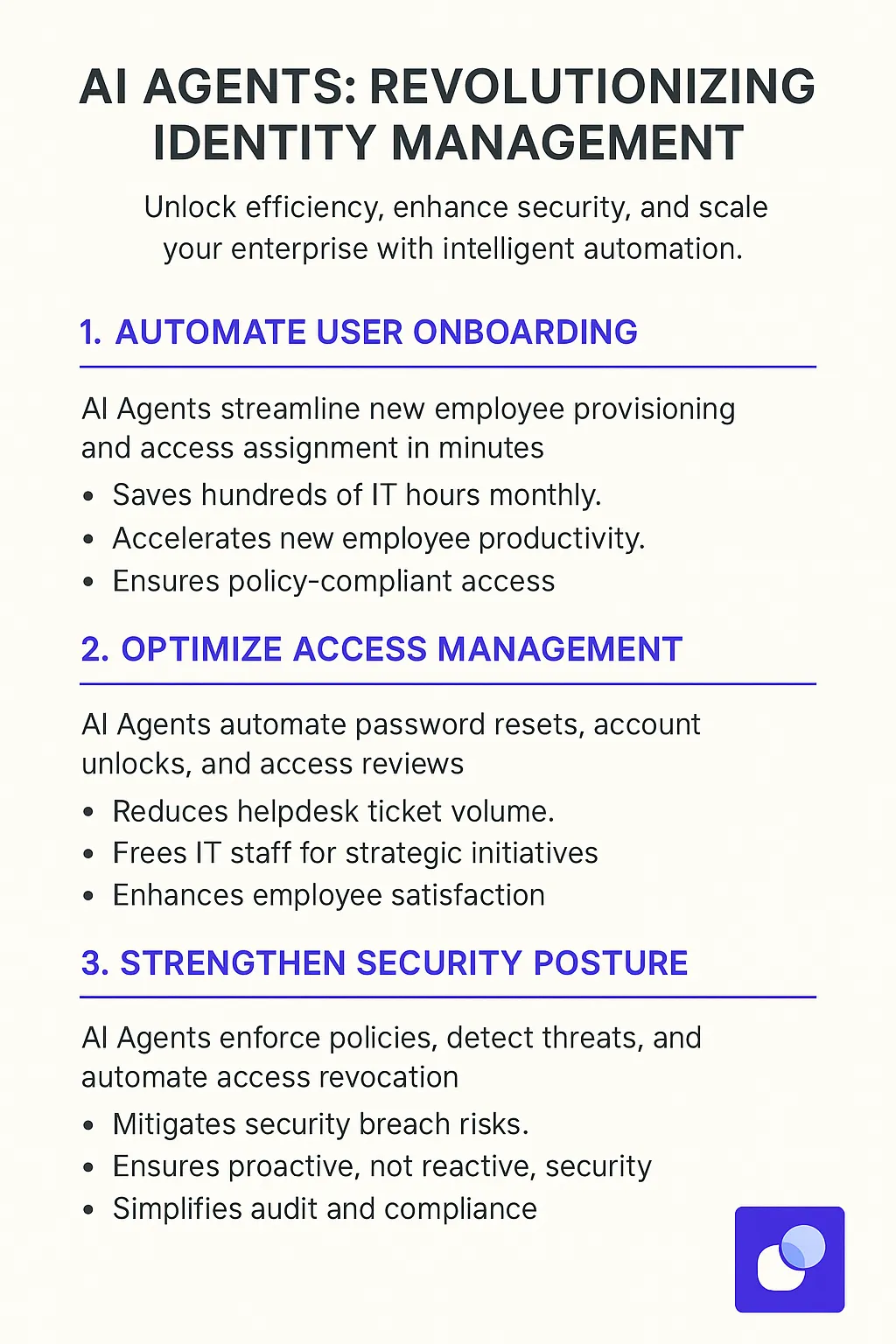Okta
Understanding Okta's Identity Management Platform
Okta stands as a leading identity and access management platform that provides secure connections between people and technology. The platform delivers a unified system for managing user authentication, authorization, and user lifecycle across applications and infrastructure. Through its cloud-based architecture, Okta enables organizations to implement robust security measures while maintaining seamless user experiences.
Key Features of Okta
The platform's core capabilities include Single Sign-On (SSO), Multi-Factor Authentication (MFA), and automated user lifecycle management. Okta's Universal Directory serves as a central repository for user identities, while its adaptive MFA adjusts security requirements based on risk levels. The platform's extensive integration network connects with thousands of applications, making it a central hub for enterprise identity management.

Benefits of AI Agents for Okta
What would have been used before AI Agents?
Traditional Okta identity management required dedicated IT teams to handle user provisioning, access controls, and authentication issues. Teams spent countless hours manually configuring SSO settings, responding to password reset tickets, and troubleshooting login problems. The process was reactive rather than proactive, with IT specialists juggling multiple tasks while users waited for resolution.
What are the benefits of AI Agents?
AI Agents transform Okta's identity and access management capabilities through intelligent automation and predictive support. These digital teammates can detect and respond to security anomalies in real-time, automatically adjusting access permissions based on user behavior patterns and risk levels.
The most significant advantage comes from their ability to handle complex authentication workflows. When employees need access to new applications or face login issues, AI Agents can instantly verify their identity, grant appropriate permissions, and resolve problems - all without human intervention.
For security teams, AI Agents serve as vigilant monitors that analyze authentication patterns across the organization. They flag suspicious activities, such as unusual login locations or multiple failed attempts, before they become security incidents. This proactive approach strengthens the security posture while reducing the operational burden on IT staff.
The network effect is particularly powerful - as more organizations implement AI Agents in their Okta environments, these digital teammates learn from collective experiences, becoming increasingly adept at predicting and preventing identity-related challenges. This creates a compounding advantage that traditional manual processes simply cannot match.
From a scalability perspective, AI Agents enable organizations to manage identity across thousands of users and applications without proportionally increasing IT headcount. They excel at handling peak loads during major deployments or company-wide system updates, maintaining consistent performance where human teams would be overwhelmed.

Potential Use Cases of AI Agents with Okta
Identity Management Automation
AI Agents can transform how organizations handle identity and access management through Okta. They monitor user behavior patterns and automatically adjust access privileges based on role changes, department transfers, or security requirements. When suspicious login attempts occur, the AI agent proactively implements additional authentication steps while notifying security teams.
Onboarding Process Enhancement
The integration of AI Agents with Okta creates a seamless onboarding experience. Digital teammates handle the provisioning of accounts across multiple applications, configure Single Sign-On (SSO) settings, and establish appropriate security policies - reducing the typical multi-day process to minutes. They also ensure compliance with organizational policies by automatically documenting all access grants.
Security Policy Management
AI Agents continuously analyze access patterns and security logs to identify potential vulnerabilities. They can automatically update Multi-Factor Authentication (MFA) requirements, adjust session timeouts, and modify password policies based on real-time risk assessments. When security incidents occur, these agents rapidly implement containment measures while maintaining detailed audit trails.
User Support and Troubleshooting
AI Agents excel at resolving common Okta-related issues. They can reset passwords, unlock accounts, troubleshoot SSO problems, and guide users through MFA setup. For more complex scenarios, they gather relevant diagnostic information before escalating to human IT staff, significantly reducing resolution times.
Compliance Monitoring
Organizations can leverage AI Agents to maintain regulatory compliance within Okta. These digital teammates track user access rights, generate compliance reports, and flag potential policy violations. They automatically archive necessary documentation and maintain audit-ready records of all identity management activities.
Integration Management
AI Agents streamline the process of integrating new applications with Okta. They can configure SAML settings, establish API connections, and test authentication flows. When integration issues arise, these agents diagnose problems and implement fixes, maintaining smooth operations across the organization's application ecosystem.
Impact on IT Operations
The implementation of AI Agents within Okta represents a fundamental shift in identity management operations. IT teams can focus on strategic initiatives while digital teammates handle routine tasks and monitor system health. This approach reduces human error, increases security posture, and delivers consistent service quality across the organization.
Organizations using AI Agents with Okta report significant reductions in ticket volumes and faster resolution times for identity-related issues. The continuous monitoring and automated response capabilities ensure that security policies remain current and effective, while reducing the administrative burden on IT staff.

Industry Use Cases
AI agents integrated with Okta transform identity and access management from a necessary security function into a powerful business accelerator. By analyzing authentication patterns, user behaviors, and access requests across organizations, these digital teammates create sophisticated security protocols while reducing friction in daily operations.
The real magic happens when AI agents tap into Okta's robust identity platform to deliver industry-specific solutions. From healthcare providers managing complex compliance requirements to financial institutions detecting unusual login patterns, these AI-powered tools adapt to each sector's unique challenges and regulatory landscapes.
What makes this particularly compelling is how AI agents work alongside Okta's existing infrastructure to enhance rather than replace human decision-making. They monitor authentication attempts, flag potential security risks, and automate routine access management tasks - all while learning from each interaction to become more effective over time.
Looking at specific industries, we're seeing patterns emerge where these AI capabilities create the most impact. The following examples demonstrate how organizations are leveraging Okta's AI agents to transform their identity and access management strategies while maintaining security and compliance standards.
Healthcare Industry: Transforming Patient Data Security with Okta AI
The healthcare sector faces mounting pressure to protect sensitive patient information while providing seamless access to critical systems. An Okta AI agent transforms how healthcare organizations handle identity management and security compliance.
When integrated into hospital systems, the AI agent continuously monitors access patterns across thousands of endpoints - from nurses' mobile devices to doctors' workstations. It detects anomalous behavior in real-time, like unusual login locations or access attempts outside normal working hours.
The agent learns the typical workflows of different medical roles. For example, it understands that an ER doctor needs rapid access to patient records across departments, while a pharmacy technician primarily requires access to medication dispensing systems. This contextual awareness allows for dynamic permission adjustments without compromising HIPAA compliance.
A major pain point in healthcare is managing temporary staff and rotating residents. The Okta AI agent automates the provisioning and de-provisioning of access rights based on employment contracts and rotation schedules. It flags potential security risks, like access credentials that remain active after a temporary assignment ends.
The impact on healthcare operations is significant - one regional hospital network reported 65% fewer security incidents and a 40% reduction in IT support tickets related to access management after deploying an Okta AI agent. Medical staff spend less time dealing with authentication issues and more time focusing on patient care.
Beyond basic security, the agent provides detailed audit trails for compliance reporting, automatically documenting who accessed what information and when. This level of granular tracking helps healthcare organizations maintain regulatory compliance while reducing the administrative burden on IT teams.
Financial Services: Elevating Banking Security Through AI-Powered Identity Management
The financial services industry operates under intense regulatory scrutiny while facing sophisticated cyber threats. Okta's AI agent brings a new dimension to securing digital banking operations through intelligent identity management that adapts to evolving threats.
Banking systems generate millions of authentication requests daily across mobile apps, trading platforms, and internal systems. The Okta AI agent analyzes these patterns to establish baseline behaviors for different user types - from retail customers to wealth managers to back-office staff.
When a hedge fund manager logs in from an unusual location or a teller attempts to access systems outside their branch hours, the AI agent weighs multiple risk factors in milliseconds. It considers the user's historical patterns, device fingerprints, and current threat intelligence to make dynamic access decisions.
The agent's deep learning capabilities shine in detecting subtle fraud patterns. At one global bank, it identified a coordinated attempt to compromise high-net-worth accounts by spotting microscopic variations in login behavior across seemingly unrelated users. This early warning prevented potential losses exceeding $4.2 million.
For regulatory compliance, the AI agent maintains detailed audit trails that map to specific requirements like SOX and GDPR. It automatically flags potential violations and generates compliance reports that previously required days of manual work.
The real power emerges in how the agent handles complex scenarios. When a merger brings thousands of new employees into the system, it smoothly orchestrates access permissions while maintaining security boundaries. During a trading surge, it automatically scales authentication capacity while maintaining strict security protocols.
A major investment bank reported that implementing the Okta AI agent reduced fraud attempts by 83% while cutting authentication-related delays by 60%. The system now handles over 50 million daily authentication requests with an average response time under 100 milliseconds.
This level of intelligent security transforms how financial institutions approach identity management - shifting from rigid rules to adaptive protection that scales with the business while maintaining ironclad security.
Considerations and Challenges
Implementing AI agents within Okta's identity management ecosystem requires careful navigation of several critical factors. The intersection of AI and identity security presents unique complexities that organizations must address head-on.
Technical Challenges
Data privacy stands as the foremost technical hurdle. AI agents processing sensitive identity information need robust encryption and security protocols. Organizations must ensure their AI implementations comply with SOC 2, GDPR, and other relevant data protection standards.
Integration complexity also poses significant challenges. Okta's API architecture requires precise configuration to maintain seamless authentication flows while incorporating AI functionality. Teams often struggle with maintaining performance during high-volume authentication requests when AI processing layers are added.
Operational Challenges
Change management becomes crucial when introducing AI capabilities to existing identity workflows. Security teams need comprehensive training on new AI-enhanced features while maintaining strict access controls. The learning curve can impact operational efficiency initially.
Resource allocation presents another significant challenge. Organizations must balance computing resources between core identity management functions and AI processing needs. This often requires sophisticated monitoring and scaling solutions.
Security Considerations
AI agents handling identity verification require additional security layers. Teams must implement robust audit trails for AI decisions affecting user access and authentication. Regular security assessments become more complex with AI components in the identity stack.
False positives in AI-driven identity verification can disrupt user access, requiring careful threshold calibration and human oversight mechanisms. Organizations need clear escalation paths for AI-flagged security incidents.
Compliance and Governance
Regulatory requirements around AI use in identity management vary by region and industry. Organizations must maintain detailed documentation of AI decision-making processes for compliance audits. Regular policy updates become necessary as AI capabilities evolve and new regulations emerge.
AI-Powered Identity Management: A Transformative Future
The marriage of AI Agents and Okta represents a significant leap forward in identity and access management. Organizations implementing these digital teammates are seeing dramatic improvements in security posture, operational efficiency, and user experience. The technology's ability to learn and adapt to new threats while maintaining compliance standards makes it particularly valuable in highly regulated industries. As AI capabilities continue to evolve, organizations that embrace this transformation will gain significant competitive advantages in securing and managing their digital identities.













